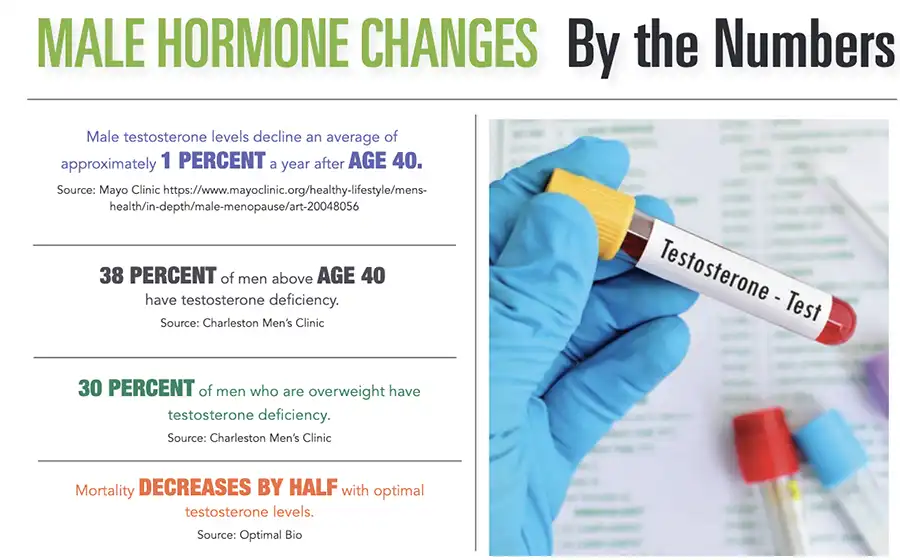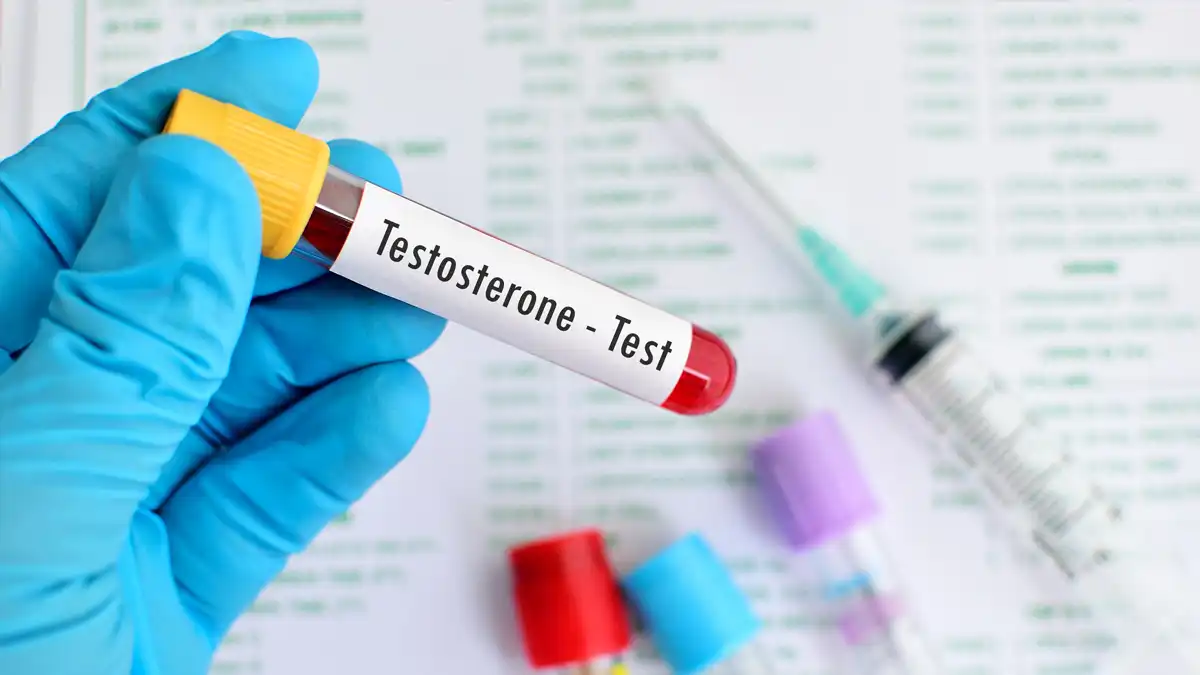While many of us associate hormones like testosterone with masculinity and sex drive, it has wide-ranging impacts on male biological functions.
Dr. Stuart Markovitz, M.D., an internal medicine specialist with Charleston Men’s Clinic, said that hormones such as testosterone play a significant role in men’s health. In addition to sexual vitality, testosterone impacts metabolism, fat and motivation. It’s linked to diet and mood.
While labeled a sex hormone, it’s more than that, asserted Dr. Markovitz. It affects our physical and mental well-being, as well as sleep. Testosterone is a regulatory chemical, much like thyroid, insulin and cortisol. It uses the bloodstream to enter cells and interacts with DNA. “It’s going into the brain and different parts of the brain which regulate thinking, moving, emotion. So, virtually every aspect of life is touched by testosterone,” he said. “It’s an amazing chemical in terms of regulation. It shapes us, who we are.”
Dr. Greg Brannon, MD, FACOG, medical director of Optimal Bio, which has eight offices throughout the Southeast, including one in Mount Pleasant, has written two books on the role of hormones in men’s health, “The Hormone Handbook” and “Restore.”
“Hormones run our body,” remarked Dr. Brannon. “They are messengers and communicators between our body. In men’s health, everything testosterone is libido, muscle. But it’s brain. It’s heart function. It’s bone formation. Our immune system. Every single cell in the body needs testosterone to do its job correctly.”
Dr. Markovitz explained that in the 1970s, a mechanism was established for evaluating testosterone levels using a blood test that quantifies the hormone using a range of numbers measured in nanograms to assess who needs it and how much. That range initially spanned from 348-1197 and anything under 348 was considered low.
But that essentially “changed overnight” in 2017, said Dr. Brannon, and the range shifted to 264-916.
Both doctors noted, though, that over the last few decades, male testosterone levels have steeply declined. “I can’t stress this enough—these ranges are important,” avowed Dr. Brannon. The range comes from the general population and 80 percent of the population falls within that group, but that range has moved left in the last half-century.
“So, the things we call normal were not here 50 years ago because having those optimal levels, those complaints were not there,” elaborated Dr. Brannon. He said that one of the biggest issues is that our bodies are being exposed to ubiquitous toxic substances, also known as endocrine disruptors, such as phthalates, pesticides, and plastics that adversely affect hormonal balance. “We need to clean up our systems.”
Signs of Hormonal Imbalance
The most common signs of male hormonal imbalance, such as low testosterone, are tiredness, brain fog, decreased sex drive, loss of frequency or firmness of morning erections, anxiety, depression, gaining body fat and loss of bone density.
Dr. Markovitz noted that testosterone production drops as we age, and our levels fall by 1 or 2 percent a year. He’s seeing a younger and younger population of patients, including men in their 30s and even individuals in their 20s with testosterone deficiencies. However, he qualified that “deficiency” is a relative term. “One person’s deficient at a different level than someone else.”
In terms of strategies for optimizing hormonal balance, even if you feel okay, it’s a good idea to get a baseline and have your hormone levels tested. “You don’t know what you don’t know,” said Dr. Markovitz. “A patient who lacks energy or has more belly fat—there’s been a change. It’s a decline from feeling fine or normal.”
Lifestyle choices, including exercise, help encourage your body. “Sleep is really important,” emphasized Dr. Brannon, as is eating eggs, protein and proper fat to maximize testosterone levels. Avoiding processed foods is also key. “I believe those things are good for your health regardless.”
“But,” he added, “if you’re still having symptoms, you should check your testosterone levels, and getting those levels in optimal ranges is crucially important for the system to run its best.”
With respect to medical approaches, there is medication that can stimulate you to make more testosterone, or you can be given more testosterone, commented Dr. Markovitz. When it comes to symptoms of low testosterone though, he stressed, “it’s all relative. We aren’t numbers, we’re individuals.”
“I talk about Testosterone Optimal Therapy to find an individual’s optimal level, not TRT,” (Testosterone Replacement Therapy) he continued. “I just want the patient to do what’s best for their interests.”
Optimal Bio uses BHRT (Bioidentical Hormone Replacement Therapy) to help men achieve optimal hormonal balance. It’s a bioidentical molecule so the body knows what to do with it, said Dr. Brannon. They use a tiny pellet that goes under the skin and directly into the bloodstream, delivering a lower dose that’s a steady state and reduces side effects.
While not critical for life like insulin and the parathyroid hormone, Dr. Markovitz explained that testosterone is an underemphasized area of medicine since most endocrinologists study insulin and thyroid hormones. As such it often is overlooked as a factor in men’s health. Unlike thyroid function, there are no routine check-ups for low testosterone, even though it’s a major indicator for cardiovascular disease.
“So, we’re missing the boat,” stated Dr. Markovitz. “We’re doing a terrible job of taking care of guys.”
By Colin McCandless








